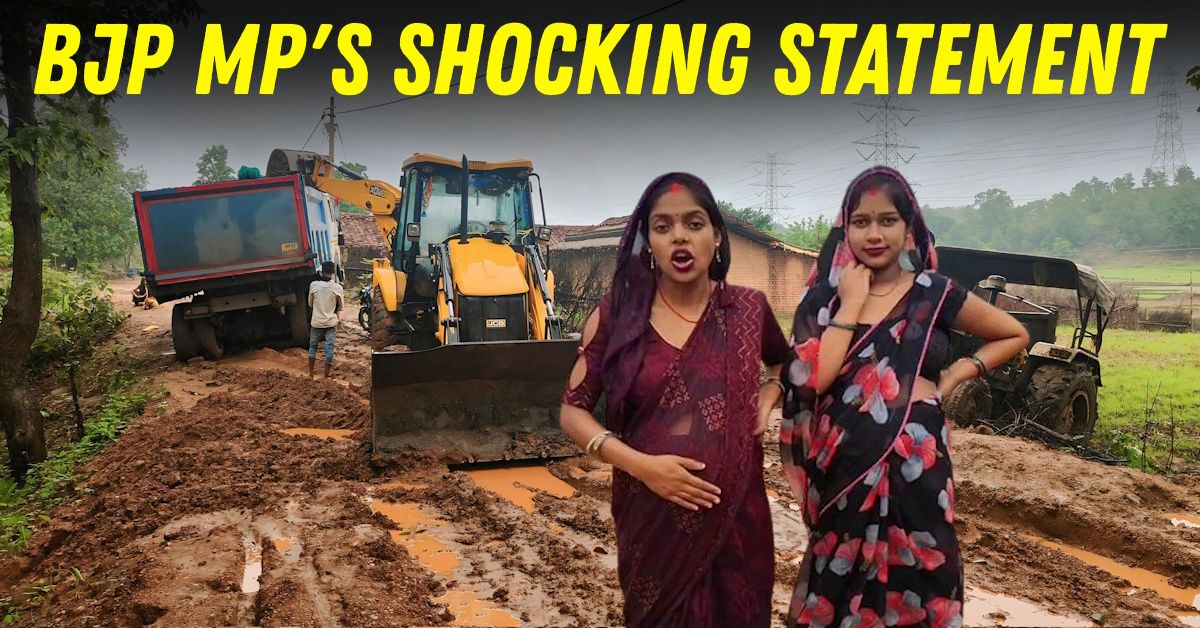BJP MP To Pregnant Women Who Want Pathetic Road Fixed: Will Get You Picked Up Before Delivery


A recent comment by BJP MP Dr. Rajesh Mishra has triggered widespread criticism and renewed debate over the lack of basic infrastructure in Madhya Pradesh. While addressing complaints from pregnant women in the state’s Sidhi district, who pleaded for a motorable road to access medical care, the parliamentarian's response that “we will get them picked up before delivery” has been labelled insensitive and emblematic of a deeper disconnect between policymakers and ground realities.
The controversy began when women from Khaddi Khurd village in Sidhi district raised concerns over the lack of access to healthcare facilities. With no proper roads in the region, pregnant women are often forced to walk several kilometres or be carried in makeshift slings through dense forests to reach a hospital. These journeys frequently stretch over hours, risking complications and even maternal deaths.
When the issue was raised during a public interaction, MP Mishra, instead of promising road development, stated that arrangements would be made to "pick them up" before labour. The remark, caught on camera, quickly spread online and drew criticism from across the political spectrum. For many, it highlighted the mismatch between government assurances and the lived experience of those in marginalised areas.
While the specific comment has grabbed headlines, it also reflects a wider failure to address rural infrastructure gaps in India’s interiors. Khaddi Khurd, located in MP's Sidhi region, has long struggled with poor connectivity.
Although the Centre and state governments have launched multiple schemes to develop roads in tribal and forested areas, progress remains slow. Factors like difficult terrain, security concerns due to insurgency, and bureaucratic red tape have contributed to the delay.
Villagers in the region continue to face hardships not only during medical emergencies but also in daily life - accessing schools, markets, and basic public services becomes a challenge without a proper road network. Women, especially during pregnancy, are among the worst affected.
Opposition parties have wasted no time calling out the BJP MP's statement. Leaders from the Congress and regional outfits have slammed the remark as callous and indicative of how the ruling party treats development in rural areas. Many social media users also expressed their anger, pointing out how such responses trivialise critical issues like maternal healthcare.
The MP later clarified that his intentions were to ensure timely transportation of pregnant women and that he had spoken to district authorities about strengthening ambulance services. However, the damage had already been done. Critics argue that the very need to plan such emergency measures stems from the absence of proper roads in the first place.
The situation in Sidhi isn’t isolated. Across the country, rural women face major risks during pregnancy due to inadequate medical access. According to the National Family Health Survey (NFHS), a significant number of maternal deaths are still attributed to delays in reaching healthcare facilities. In regions with no roads, the situation becomes dire.
What makes the MP’s comment particularly troubling is the suggestion that ad hoc arrangements are a sufficient substitute for lasting solutions. Health activists point out that while better ambulance coordination is helpful, it cannot replace the security, dignity, and access that a permanent road provides.
Over the years, many politicians have promised to bring development to far-flung regions. Yet, when it comes to delivering on essentials like roads, results remain underwhelming. Instead of investing in long-term infrastructure, the focus often shifts to damage control and short-term optics.
With elections always around the corner, infrastructure development in remote constituencies is often reduced to a talking point rather than a policy priority. The Sidhi incident highlights this uncomfortable truth - that for many in power, promises are easier to offer than real solutions.
The latest outrage may fade from headlines in a few days, but for the women walking barefoot through forests in labour, the problem is all too real. Unless there’s a systemic push to bridge the infrastructure gap in such regions, comments like “we’ll pick them up” will continue to sound less like solutions and more like neglect wrapped in convenience.